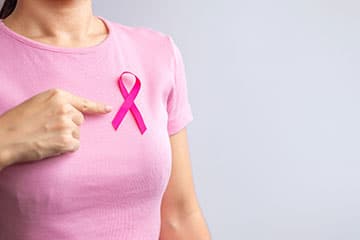Breast cancer is the most common cancer among women in the U.S. According to the American Cancer Society, 297,790 new cases of invasive breast cancer will be diagnosed in U.S. women in 2023. Breast cancer occurs when the breast’s cells grow out of control. Most breast cancers begin in the ducts or lobules, and can spread to other parts of the body through blood vessels and lymph vessels.
SYMPTOMS OF BREAST CANCER

- A lump in the breast or armpit
- Swelling or thickening of a breast region
- Breast skin irritation or dimples
- Flaky or red skin around the breast or nipple
- Nipple pulling in or nipple region discomfort
- Bleeding from the breasts, including in breast milk
- Any change to the breast’s size or form
- Pain in any part of the breast
Illnesses other than cancer can cause similar symptoms. if you notice any symptoms of concern, see your doctor right away.
Lifestyle Changes to Reduce Risk of Breast Cancer
- Cut alcohol use: Drinking alcohol increases risk of breast cancer. Studies say that even moderate alcohol consumption is linked to about a 30-50% increased risk in breast cancer. Given the impact of alcohol on breast cancer risk, the general advice is to limit your intake to one drink per day.
- Maintain a healthy weight: Eat healthy and exercise regularly can help you maintain a healthy weight. Work to keep up a healthy weight if you have one. Ask your doctor for advice on appropriate weight-loss methods if you need to. If you are overweight, you should eat fewer calories each day and gradually increase your workout.
- Exercise regularly: Exercise can help you maintain a healthy weight and lower your risk of developing breast cancer. Aim for at least 150 minutes of moderate aerobic activity per week or 75 minutes of strenuous aerobic activity per week, including strength training twice per week.
- Breastfeeding: Breastfeeding may help prevent breast cancer. The protective effect increases with the duration of breastfeeding.
- Limit postmenopausal hormone treatment: Combination hormone therapy can increase risk of breast cancer. Discuss the advantages and disadvantages of hormone therapy with your doctor. Medications and non-hormonal therapy can help control your postmenopausal If you determine that the advantages of short-term hormone therapy outweigh the potential risks, it is important to use the minimal effective dosage and to regularly consult with your doctor to monitor the duration of hormone usage.
Living a healthy lifestyle and eating a balanced diet will reduce your risk of getting cancer and increase your chances of surviving if you do get cancer.